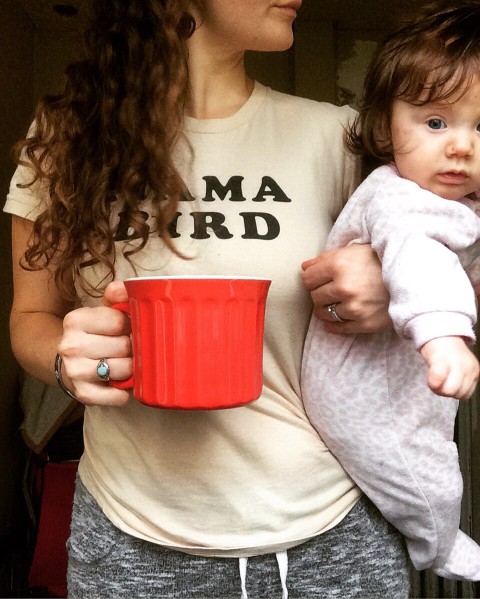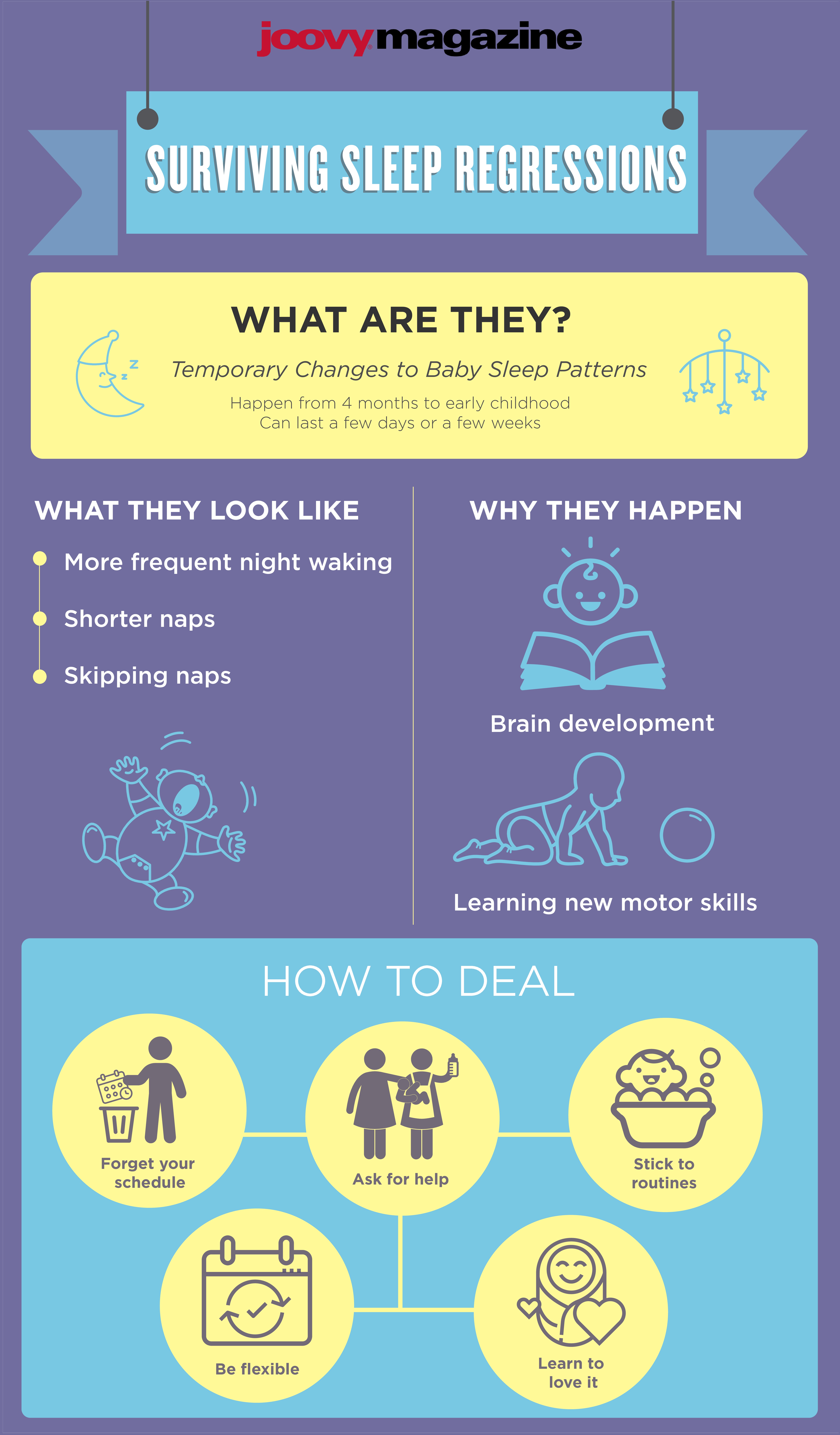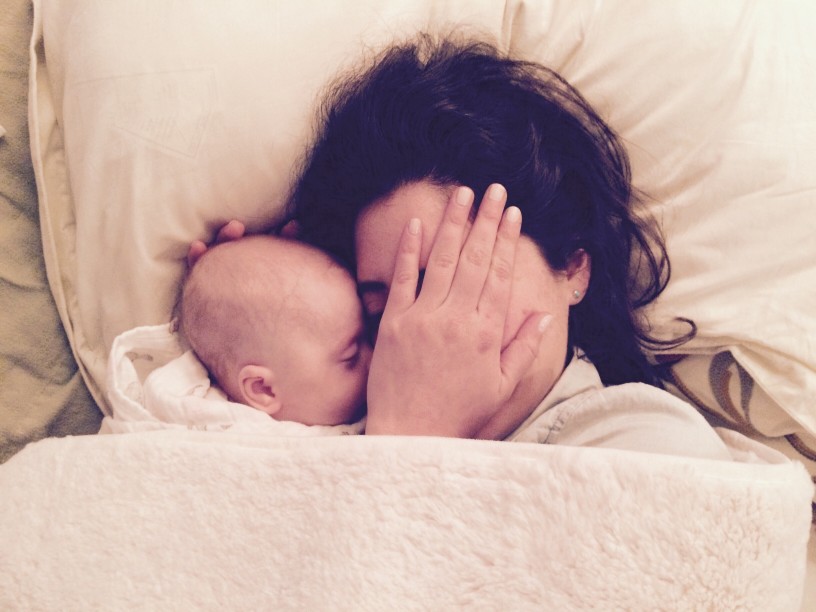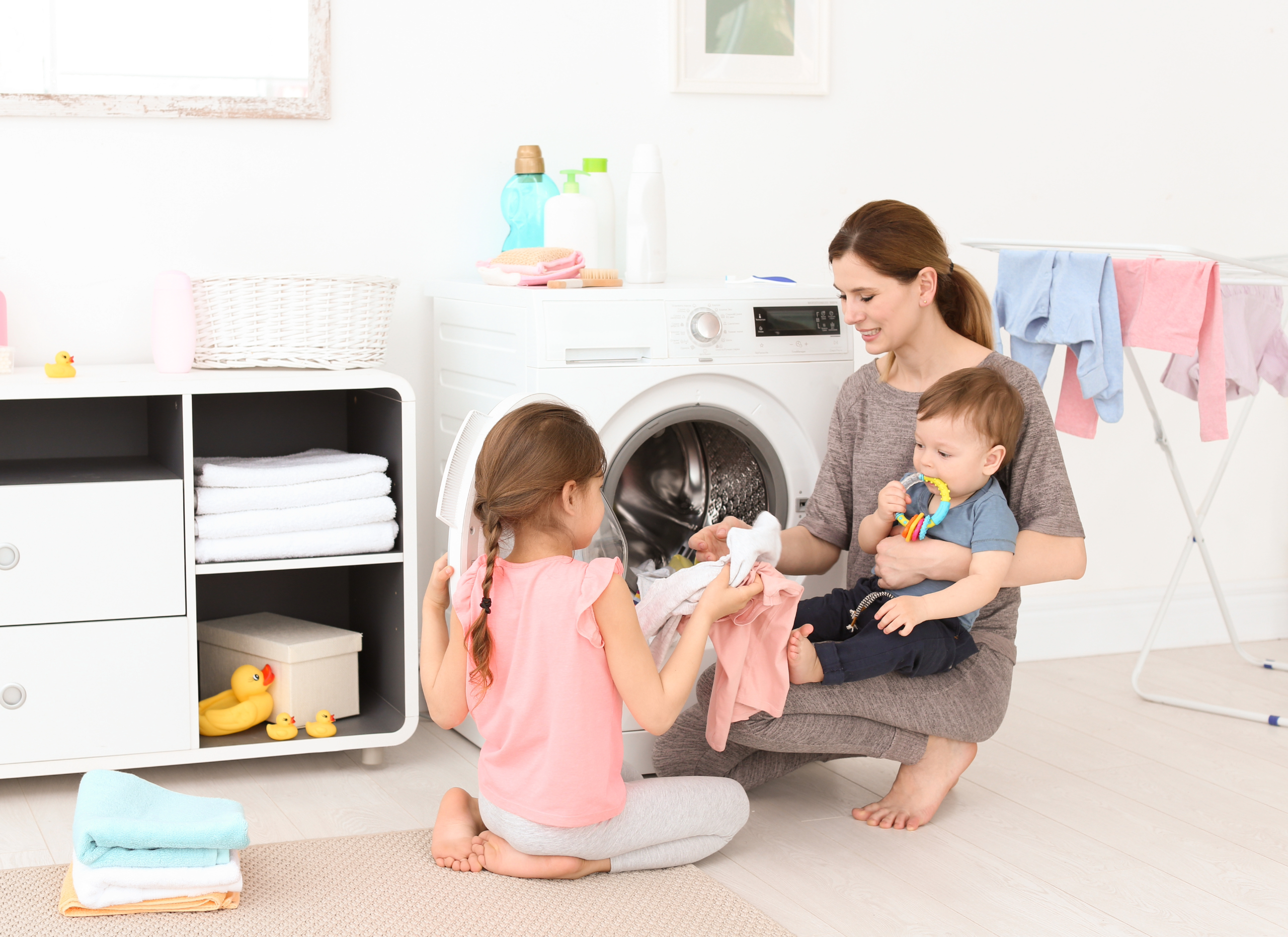How to Survive Sleep Regressions
Parents are experts at sleep deprivation. When a tiny human’s survival is dependent on you, you learn some creative ways to cope with fragmented sleep pretty quickly.
But what about those periods of time that seem never-ending, when babies just WON’T sleep? When naps come and go, when your entire schedule gets turned upside down, just as you think you’re starting to nail it?
Sleep regressions are periods of time in which babies are doing some major growing, both physically and mentally. They’re learning new motor skills or developing new parts of their brain that have previously been pretty quiet.
These periods of time are SO exciting for babies, it often results in a disruption in the sleep routine you’ve worked so hard to establish. Babies will often skip naps and wake at odd hours for long stretches of playtime.
We chatted with certified child sleep consultant Joanna Martindale to get her tips on coping with sleep regressions.
Better yet: we learned how to thrive during them.
Changing the Way You See a Sleep Regression
 Joanna has a lot of experience with babies who won’t sleep. In her work as a certified sleep consultant, she’s worked with parents and babies across a wide variety of scenarios, ranging from your typical newborn development sleep regressions to working with children struggling with behavioral issues to boot.
Joanna has a lot of experience with babies who won’t sleep. In her work as a certified sleep consultant, she’s worked with parents and babies across a wide variety of scenarios, ranging from your typical newborn development sleep regressions to working with children struggling with behavioral issues to boot.
She’s a board-certified behavior analyst, owner of Baby Sleep Concierge, and a mom who has been there, and so done that. We knew she’d be the woman to talk sleep regressions with.
“I believe that words hold a lot of power. Calling something a “regression” implies that the baby has gone backward in some way, when the opposite is actually true.”
Joanna says that instead of looking at sleep regressions as setbacks, we need to look at them as good things, developmental progressions that mean our babies are growing and developing at a healthy pace.

“I prefer to call these times developmental “progressions” instead, because really, that is what is happening during these phases. Let’s give our babies some credit for all that hard work!”
It’s tough to be optimistic when you’re rocking a baby to sleep at one in the morning, but Joanna makes a point that’s founded in how our brains are wired: how we perceive what happens has the power to shape how we handle these situations.
Scientists have discovered that even physical pain can be overcome by mental perception, and the same holds true for other challenges. What we focus on, we amplify, but positive thinking can actually help us to cope with sleep regressions in a way that’s healthy, both for baby and parent.
When You Can Typically Expect a Sleep Regression

Sleep regressions (or developmental progressions) typically happen at specific developmental milestones. Something changes, the baby’s brain gets stronger and mightier, and suddenly, sleep doesn’t sound like such a great idea.
“There is a lot of cognitive development happening at the four-month mark, for example,” says Joanna.
“The baby is coming out of the 4th trimester and becoming more aware of his surroundings, sequencing events together, recognizing people and voices, and so much more. We see it again around eight months as the baby begins going through separation anxiety. We also see it when the baby is learning a new physical milestone, such as rolling, crawling, standing, walking, etc.”
While every baby is different, you can typically expect these regressions to hit around these times:
4 months
- End of the fourth trimester
- Able to sequence events
- Fully functional eyesight
- Recognizes people and voices
8 months
- Brain and motor skill development
- The beginnings of crawling, standing
- Separation anxiety typically starts
12 months
- Sleep changes, naps may decrease temporarily
18 months
- Separation anxiety flares up again
- Begins having opinions about sleep
- Teething
- Nap transitions
24 months
- Sometimes nightmares play a role
- Independence can create arguments around bedtime
- More napping transitions
Use the Wonder Weeks app to give yourself a heads up if you’d like to see what’s happening and when, but keep in mind that this is just a guideline — babies don’t believe in rules (or calendars).
So What Do I DO??!

We get it — coping with a sleep regression, no matter how well-informed you are and no matter how positive you’re thinking, can be incredibly difficult.
You’re not alone, and you’ve got this. Joanna shared some of the tips she gives to her clients over at The Baby Sleep Concierge, and they’re golden.
#1 — Stick to Rhythms Over Routines

When a sleep regression happens, many parents feel the need to dig their heels in deeper on their routines and schedules. Joanna says it’s not practical and can cause more stress than it relieves.
“I think “routine” and “schedule” put a lot of pressure on parents, so I coach parents into maintaining a rhythm to their day instead. The timing of naps will likely vary from day to day (depending on whether the nap was 30 minutes versus two hours), which is okay. Parents should stick to their rhythms and wind-down routines before naps and bedtime always. Having a predictable rhythm to their day will actually keep a baby more calm and centered.”
Clinging to a routine can also create a baby who’s overtired and resistant to sleep as a result. The lesson? Let them sleep when they’re tired, and just keep on keeping on — the clock is pretty irrelevant at this stage.
#2 — Know That Babies With Bad Habits Aren’t a Thing

When you’re just doing what you need to do to survive, the last thing you want to hear is that your survival method is going to create a monster. There’s good news though:
- You can officially stop listening to people trying to tell you you’re doing it all wrong.
- You can’t create a baby with bad habits.
“I think no bad habits can really be created for a baby because small babies do need to be parented to sleep,” says Joanna.
Give baby all the cuddles, all the time — nobody ever suffered from being loved too much.
#3 — Trust Your Gut (And Stop Googling)

Sleep regressions last as long as they last — sometimes a few days, sometimes a few weeks. Don’t overthink it, and don’t drive yourself crazy comparing your baby’s sleep habits to someone else’s. Everybody is different, and there is no hard and fast rule for what this is supposed to look like.
If the only way you can get your baby to sleep for longer than five minutes is to push him around in the stroller, then do what you have to do. It doesn’t have to be perfect because it definitely isn’t forever.
“Sometimes babies need a little bit more support from us, which may translate into napping in a carrier, stroller, or a caregiver’s arms for a few days. The phase is just that — a phase. It will pass and life will get back to your “new normal.”
#4 — Don’t Be Afraid to Ask for Help

Parenting has become a lonely journey, but it’s not supposed to be. Generations before this one, parents were leaning on each other in ways not seen in modern parenting. Friends and family coming over to hold your baby during a shower was an almost daily occurrence. In-laws lived with you to help you raise your littles together, and you never spent days by yourself trying to make it all work.
All that to say, raising babies is hard, and it’s not just okay if you need help — it’s normal.
“If a parent’s sleep situation is feeling unbearable, then it is always a good idea to reach out to a few sleep consultants (or doulas, night nannies, etc.) to get some help on the sleep front.”
#5 — Get Creative When It Comes to Siblings

When you have a baby going through a sleep regression and one or more older siblings to boot, life starts to feel pretty impossible.
Joanna’s advice goes back to asking for help when you need it, along with getting creative to keep older littles occupied while you try to get baby down for naps.
“Don’t worry about naps being independent in the crib, it’s okay if they’re in the stroller while your older one is playing at the park.”
“I also love creating a “busy box” for older siblings while parents are nursing or putting baby down to sleep. The busy box can be full of items that either your child has never seen before, or it has been a while. They only get access to this box during these times when parents are tending to the new baby, so that it is always exciting. Change out the items you put in there every few days to keep them guessing.”
You Can Do This

It can feel neverending but remember: this is an AMAZING time for your baby. It’s a whole new world, and he’s seeing and experiencing it all for the first time. Drop schedules and expectations, and lean into making these moments count for you both.
It will feel challenging at times, but it can also be some of the most incredible moments you’ll share with your baby. Don’t let them blur into memories of frustration, let them bloom into moments of amazement.








My twins are terrible night time sleepers. They’ll be two next month. They share the same room and that doesn’t seem to be a problem. They take one afternoon nap from 1230-2ish. We start the bedtime routine between 7-730-bath, pajamas book and bed. They won’t go to sleep unless my husband and I stay in the room. They also wake many times in the night. They wake so often, we end up cosleeping so they’re not screaming all night and my husband and I get some sleep. Should we go back to letting them cry it out in the night? Should we leave the room at bedtime?
Hi Shelley!
Thanks for your question! Firstly, if you and your husband are actually okay with cosleeping, then there’s no need to change it. Many families choose to bedshare throughout childhood. That said, my guess is you’re not okay with it and hence the question. 🙂
The best way to decrease night wakings is to first teach them how to fall asleep on their own at bedtime. Sleep science tells us that if a child can fall asleep on their own at bedtime, they are more likely to generalize that skill to middle of the night wakings. At this age I don’t advise having them cry it out – there can be lots of feelings of abandonment and it just doesn’t feel right as a parent. Target bedtime first. You can gradually move yourself out of the bedroom by moving yourself closer to the door each night as they fall asleep, especially since they like to have you in the room as they fall asleep. Every 3 or so nights move yourself closer to the door, then the doorway, then outside the doorway, until you’re out of the room. Since they’re almost 2, you want to make sure you’re talking to them about the upcoming changes and even do some role play with dolls on what their new routine will look like. This age brings out a lot of imagination as well, so keep in mind that nightmares begin at this age. Sometimes introducing a night light and a security item (blanket or lovey), can give them those comfy feelings.
I hope that helps a bit!
My four year old really struggles with sleep, always has. He acts really tired around midday, but he hasn’t napped since he was 18 months old. Should we try to get him to nap anyway? Mentally, he’s very resistant to the idea.
He’s typically in bed by 730, but doesn’t go to sleep until around 9pm, and then is up by 7am the next day.
Hi Destiny!
At 4 years old it’s not uncommon to no longer need the nap and since he’s not falling asleep until close to 9pm, I would think introducing one at this stage would only make bedtime later. At this age it’s important to get to the root of the problem and oftentimes we see anxiety at this age. I look at diet, activity level, emotional wellbeing, and more to really find the root of the sleep issues.
There is a CD (you can get it digitally as well) called Dinosnores that is essentially meditation for children. It goes through some calming techniques and lets their mind focus on the story without other thoughts interrupting their wind down routine. That could help him fall asleep faster at bedtime.
Ultimately some kids simply need less sleep, anywhere from 10-12 hours overnight is what we tend to see. So 9pm-7am is 10 hours and that could be enough for him. If that schedule works for everyone involved then no need to change it but if it doesn’t, then looking at ways to get him to fall asleep earlier could be beneficial to your family.
I just wanted to say thank you for saying that we can’t create bad habits, I needed the reminder. I have a four year old, an almost three year old and a 5.5 month old. I’ve been dealing with the 4mo sleep transition since 3.5 months with him. My other two were good sleepers and this transition has lasted sooooo long. Many people have had many opinions…we’ve just been keeping on, my way. And slowly, we are getting longer naps and longer stretches of sleep at night. And lots of extra sleepy snuggles.
Oh Angie, we’re here for you! There’s no instruction manual for kids, and we all just do the best we can. It sounds like you’re handling a very tough situation very well – keep up the great work mama <3
Angie that is music to my ears!! I love hearing that you are trusting your gut and raising your baby the way you want to, and the way that feels good to you! Keep up the amazing work!
My five month old refuses naps despite being exhausted. And he will not go to bed before 10:30. Sometimes he’s up till midnight. He cluster feeds from 8:30 on so he is crying on the hour for more food. And if it’s not for more food, it’s to have a diaper changed – all things that warrant us taking him out of his crib. He is also awake by 5/6 am so he is definitely not getting enough sleep. He is teething now as well so it seems extra cruel to try to start letting him cry it out. Any suggestions?
Hi D!
You must be exhausted! At this age naps are often tricky and being overtired can perpetuate an overtired cycle. I would make sure that the environment is set up for success with blackout curtains (pitch black think of a Vegas hotel room) and white noise. If you’re going for independent sleep in the crib, only go for the first nap of the day and allow all other naps to be assisted. This means in the carrier, your arms, on your chest, or wherever it is easy for baby to fall asleep. At this point it sounds like baby needs to get out of the overtired cycle and the best way to do that is to let baby sleep by any means necessary to catch up on that sleep.
I hope that helps!
Hi!
I have an almost two-year-old and an almost four-year-old. They used to both take naps, but it’s been close to six months since they’ve taken regular naps. We certainly appreciated the free few moments that we had to do whatever we needed to do around the house. It seems like they keep each other awake and entertained. Is this normal? Do we need to be enforcing naps? I would note that they do take naps at daycare, just not on the weekends at home. Thank you!
Hi Anthony!
Great question – I feel you on the napping child no longer napping, it’s kind of the worst! No naps for the 4 year old is developmentally appropriate. They can take some quiet time instead of the nap. You could set up coloring or building stations to keep them busy during the quiet time. I would think that the 2 year old still needs that daytime sleep to happily make it until bedtime. So yes this is normal. If the 2 year old is handling being awake all day on the weekends then continue as is, but if not see if they can take a solo nap.
Hello!
Thank you for doing this free consultation. I’m so jazzed that I get to ask you for help. I have twin 9 month old girls. Right now we have a tricky schedule because of school drop offs and pick ups but I am able to squeeze in three naps for them a day. I’m not sure if we’re going thru a leap week or if it was the holidays throwing us off our routines but the naps aren’t as long as they used to be. When is the right time to cut down from 3 to 2 naps? They sleep okay at night. They start off in their cribs and then end up with me at night for feeding. Night weaning would be a dream but we aren’t there yet.
Hi Michelle,
9 months is the average age to drop from 3 naps to 2 so that is likely what is happening for you baby girls. I like to go by awake windows and often at this age, going by a 2-3-3.5 rhythm works really well. So the first awake window is 2 hours, then next is 3 hours, and the final one is 3.5 hours.
Planning pick ups and drop offs can be super tricky, but ultimately their current nap schedule will be changing and become more in line with car rides.
Oh no, I think my comment didn’t post. I’ll retry. I have twin little girls who are 9 months old. We have a hectic schedule due to older sisters being in kindergarten and preschool but I still manage to squeeze in 3 naps for them throughout the day. I’m not sure if it was because of the holidays that passed or it being a sleep regression but the naps haven’t been as long. Is it time to cut from 3 to 2 naps a day?
Thank you so much in advance!
So my girls are 15 months and 15 days apart. My oldest is 2 in April and my youngest is 6 months on Friday. My oldest sleeps great in her crib but we have to be in the room until she falls asleep. My little one is very finicky and teething, hates nursing in the rocking chair, and my husband works and goes to school full time so I’m all alone with two kids. Any suggestions on how to create the best bedtime routine?
Hi Catlin!
Oh that sounds rough! My husband travels a lot for work so I know firsthand how difficult bedtime with 2 under 2 can be! I would suggest staggering their bedtimes so you’re not trying to get them to sleep at the exact same time, and putting the baby down first before you’re toddler. This way you can be hands-free for your toddler’s bedtime and stay in the room for her if/when needed.
Try dimming the lights in the house at least an hour before bedtime so the wind down routine is clear and keep it on the early side to save your sanity. Teething is always difficult and I am an advocate of anything that provides relief from that pain. Creating the busy box I referred to in the article can help keep your toddler busy while doing the baby’s bedtime routine as well.
I hope that helps!
Hello!
I have a five and a half month old who is awake every two hours during the night and he only wants to nurse to go back to sleep. Sometimes it’s a full feed and other times it’s more comfort sucking than anything. He used to sleep through the night before the four month sleep regression (which I know changes their sleep patterns to be more adult-like). I know this won’t last forever, but he completely loses it when I try to help him fall back asleep without nursing. How can I help him sleep longer stretches at night? He will not take a bottle if you needed to know that.
Thanks!
-An exhausted Mama
Hi Stacey,
That sounds super exhausting! And yes it will not last forever so if you have someone to help you in the middle of the night then use them! But if not, then even having someone else go in and check on baby to help soothe them back to sleep can be very effective since you’re nursing. Baby can smell you very intensely and the temptation is just too strong to pass up! If you’re on your own, then go ahead and work your way up the “soothing ladder” where you try things other than nursing to get him back down, and the last step of the soothing ladder would be nursing. Ultimately you want to replace nursing with something else so if he finds his thumb or can use a pacifier then that can offer you some relief.
Sometimes waiting a few minutes to respond in the middle of the night can be beneficial to just see what he will do, if he’s even truly awake. Often we respond too quickly to our babies where if we gave them a few moments they might roll over and go back to sleep.
I would also suggest contacting a lactation consultant to work with him on taking a bottle so that you can have a break!
I’m trying so hard to move my 6 month old away from her swaddle, but she refuses to sleep any other way. She cries and cries and cries. Unless she’s asleep next to me, then I can sometimes get it to happen. Everyone has said I have to stop swaddling because she’s rolling over. What do I do? I thought babies were supposed to just grow out of them.
We’ve gotten her a crib and we’re going to try modified cosleeping when it gets here.
Hi Caitlyn,
Great question! It’s true that we want to take their arms out of the swaddle as soon as they begin to roll over so they don’t get stuck on their tummies with no way to get back on their backs. Most startle reflexes go away around the 3 month mark, but not all. There are a few transition swaddles on the market as well – I like the zipadeezip for this age because they can roll and crawl in it. You can also place baby in the crib or bassinet with her arms and legs touching one side of the crib so she feels a bit more snug.
I hope that helps!
My 14 month old has been a great sleeper since around 6 months of age. 2 solid naps and 11 – 12 hours of sleep at night. However, lately his naps have been all over the place. Just when we think he may be ready to transition to one nap, he’ll have a day or two with two solid naps again! Any suggestions for handling this period? I don’t want him to get over tired and then start having problems at night.
Hi Dana,
This is completely normal for your 14 month old to be doing. This nap transition is the absolute hardest and can take the longest for your toddler to solidify. During the transition he will have some days he can handle the awake windows of 1 nap, while others he is more tired and will still need 2. The best thing you can do is remain calm and flexible about it now that you know it is normal and that he may need more sleep on certain days.
To avoid being overtired, don’t be afraid to do an early bedtime on the days that he takes one nap. This will help for an easy night transition.
Hi! I have a 5 month old that is currently going to the 4 month sleep regression. He naps great and goes to bed great, but he is dependent on a pacifier. That lends to us waking up frequently in the middle of the night to help him put it back in. Do you recommend that we continue doing that? Also, he has a bedtime of 7:00 p.m.. Do you think that that is too early? I struggle with the thought of not having a routine and schedule for a baby.
Hi Rachel,
Yes I would recommend continuing the pacifier since he’s sleeping so great for naps and bedtime. You can start to try and teach him to replace it on his own but most babies don’t gain that skill until closer to 8 months. Once he’s able to grab it on his own, he won’t be dependent on you to replace it all night and he’ll have his own soothing mechanism.